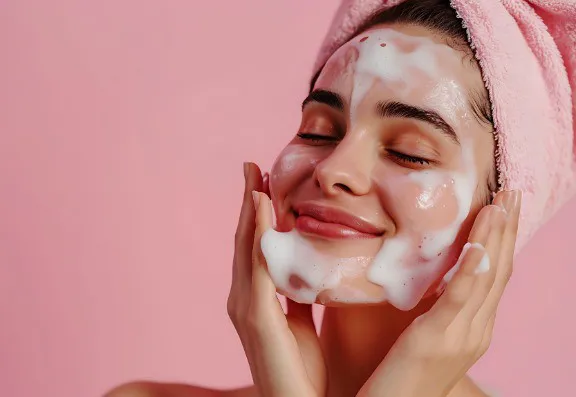Ectoin is an amino acid derivative used as a multi-functional skincare ingredient that offers a variety of benefits. It’s great for strengthening the skin barrier and also reducing water loss. Google searches have increased by 163% over the past six months, indicating that it’s an ingredient to watch in 2024.
The second biggest trend for the year ahead was identified as ‘skin streaming,’ which advocates a slimline skincare routine to prevent damaging the skin barrier.
Reverse skincare, bio retinol and hypochlorous acid also appeared in the top 10 biggest skincare trends for 2024.
Exosomes
Exosomes are also making waves in the regenerative aesthetics field. Exosomes are an attractive prospect because they can instruct older cells to act like younger ones.
Exosomes are nano-sized naturally-occurring ‘extracellular vesicles’ produced by almost every cell of living organisms. They act as messengers, ferrying signalling molecules like proteins and other genetic materials to tell cells how to behave.
They can be sourced from humans, animals, and plants, but remember that cosmetic or off-label use of human biological products is illegal in Europe and the UK.
Exosomes can contain many different substances, including peptides, lipids, growth factors, vitamins and minerals, and DNA. They can speed up healing and repair after aesthetic treatments, improve cellular communication, and stimulate collagen, elastin, and
HA.
As no exosomes have been approved by the likes of the Food & Drug Association (FDA) or the MHRA, they are not allowed to be injected but can be applied topically or via
microneedling.
Organic and environmentally conscious skincare
In tandem with scientific breakthroughs, the future of skincare is also rooted in nature. Organic ingredients sourced from plants, fruits, and botanicals are gaining popularity for their efficacy and sustainability.
One of the key drivers behind the rise of organic skincare is the growing awareness of environmental issues and the desire to reduce our carbon footprint. By choosing products made with organic ingredients, consumers can support eco-friendly practices while indulging in luxurious skincare experiences.
Moreover, the shift towards natural skincare is about more than just what’s in the products but also what’s not. Many consumers are opting for clean formulations free from harmful chemicals, synthetic fragrances, and artificial preservatives. This move towards clean beauty reflects a broader cultural shift towards wellness and mindfulness, where self-care extends beyond skincare routines to encompass conscious choices that promote health and harmony.


